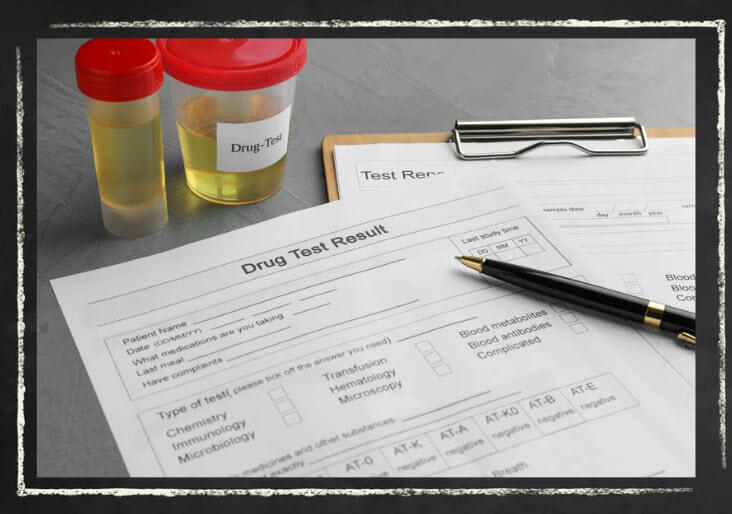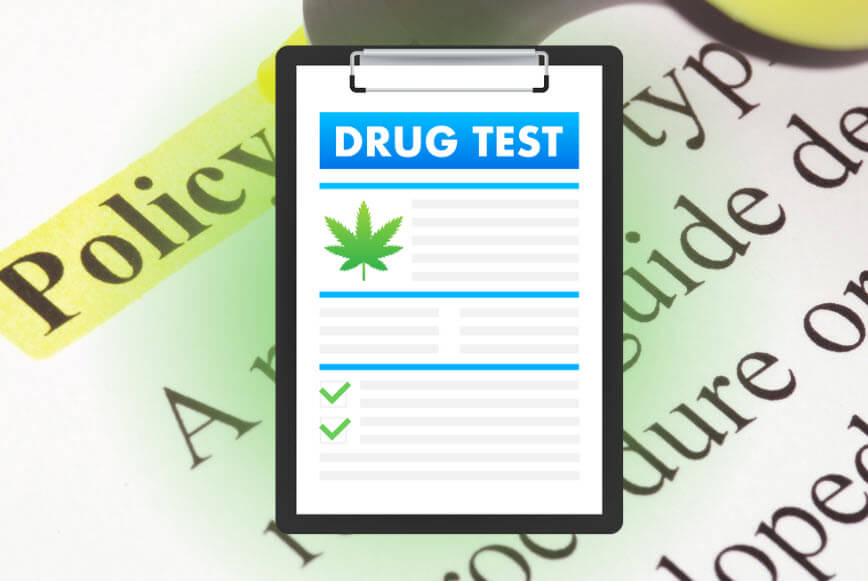What should a pre employment drug test policy include to be legally sound and fair in 2024? Employers seeking to maintain a drug-free workplace need to navigate federal and state regulations carefully. This article will provide insights into establishing a compliant policy, important legal twists, and best practices to ensure both employer and employee rights are protected.
Key Takeaways
- Employers must create pre-employment drug testing policies that are compliant with federal, state, and local regulations, ensuring fairness and non-discrimination for all drug test candidates.
- There are different types of drug tests (urine, hair, saliva, blood) each with their own detection windows and advantages, and employers need to choose the right test to meet their specific requirements.
- Understanding state regulations, especially regarding the legalization of marijuana, is critical for employers as they can vary widely and have significant ramifications for pre-employment drug testing procedures.
Establishing a Compliant Pre-Employment Drug Test Policy

Creating a compliant pre-employment drug test policy is a critical component of an organization’s hiring process. Such a policy aims to screen prospective employees for potential substance abuse, including illegal drugs and prescription medications. It’s essential to research state and federal laws before initiating a drug-testing program to ensure complete compliance.
A written policy is key to maintaining this compliance, and resources such as the U.S. Department of Labor’s Drug-Free Workplace Advisor can be instrumental in crafting a sound policy. Testing for drugs prior to employment as part of an established drug testing policy is one step to ensuring compliance with the drug free workplace act. Adding additional sections to maintain a drug free workplace, conduct random drug testing after employment, and even an alcohol rehabilitation program, show the commitment of an employer to this important topic.
Let’s delve deeper into the significance of compliance and the key federal laws that govern drug testing.
Importance of Compliance
Developing drug testing based on compliance with state and federal drug testing requirements is not just a legal necessity; it is a fundamental aspect of ensuring fair employment practices. Employers must conduct pre-employment drug tests on all applicants post-offer in a manner that upholds the legality dictated by the Americans With Disabilities Act. Compliance is not just about avoiding penalties; it’s about promoting an environment of fairness and equality.
Similar to annual reviews of HR policies for benefits, handbooks, and so on, the drug test policy should also be reviewed and updated on a consistent basis. Tests change, as do laws surrounding them. A regular and consistent plan to
Key Federal Laws
There are three key federal drug testing laws that employers should be aware of when designing their drug testing policies. Although they were established in the 1900’s, these laws create the backbone of any effective drug-testing policy:
- The Drug-Free Workplace Act of 1988 mandates that federal contractors and recipients of federal grants establish a drug-free workplace policy.
- Title VII of the Civil Rights Act of 1964 requires employers to implement drug testing policies without discriminating based on race, nationality, religion, sex, or color.
- TheAmericans with Disabilities Act of 1990 protects individuals with disabilities and those who have overcome substance abuse from discrimination, while allowing employers to test for illegal drug use.
Types of Pre-Employment Drug Tests

When it comes to actual testing, employers have several options to test job applicants. Most commonly, employers use urine screens or saliva tests for initial drug screening prior to employment. These tests typically screen for illegal drugs and alcohol, including random drug testing for substances such as:
- amphetamines
- marijuana
- cocaine
- opiates
- phencyclidine
Some employers may opt for a broader panel to screen for additional substances. Candidates should always bring any prescription drugs to their drug test, including that of being a registered medical marijuana patient, to ensure these are considered when interpreting test results.
Employers are not permitted to use non-psychoactive cannabis metabolites, which can remain in the body for weeks after use, as the basis for initial hiring decisions. This practice is prohibited under current regulations.
Let’s take a closer look at each of these test types.
Urine Tests
Urine tests are a common choice for job candidates prior to beginning work due to their practicality in identifying recent drug use. They have a detection window of 5 to 10 days. If an initial urine screen indicates the presence of drugs, a confirmation screen is conducted to verify the result before it is reported to the employer.
This two-step process ensures accuracy and fairness in the testing procedure.
Hair Tests
Hair tests, on the other hand, can identify drug usage that occurred months prior to the test. However, they are unable to detect recent drug use or the presence of alcohol. They might not be the first choice for many employers, but they do serve a unique purpose in detecting long-term drug use.
Saliva Tests
Saliva tests are advantageous for drug screening prior to employment because:
- They can be easily collected on-site.
- The collection process can be observed directly, minimizing the possibility of specimen tampering.
- Conducting these tests on-site can lead to substantial savings in time and costs for employers.
With a detection window of approximately 7-21 hours, they are suitable for recent-use detection.
Blood Screens
Taking blood is perhaps the least common method used in pre-employment screening for drug use. The tests require drawing a sample of blood by a licensed phlebotomist, which is then sent to a laboratory for analysis. The use of blood screens is limited due because the tests are both expensive and somewhat invasive.
However, analyzing a blood sample for drugs provides a high level of accuracy and it can detect a wide range of substances.
State Regulations and Their Impact on Drug Testing Policies

State regulations play a significant role in shaping how employers conduct drug testing prior to employment. The implementation of these policies can vary greatly between states. For instance, as of the date of this post, 37 states have legalized the use of either medicinal or recreational marijuana, which greatly affects pre-employment drug testing regulations.
In addition, seven states states have legalized the use of CBD oil, while other forms of marijuana are not legal. Finally, seven states—Idaho, Kansas, Nebraska (decriminalized), North Carolina (decriminalized), South Carolina, and Wyoming prohibit marijuana use in any form.
| States where marijuana is not legal in any form | Rely solely on Federal pre-employment drug testing laws | Types of Employers to which State restrictions apply |
|---|---|---|
| Idaho | All employers | |
| Kansas | State government employers | |
| Nebraska (decriminalized) | Public sector employers Private sector employers with at least 6 employees | |
| North Carolina (decriminalized) | All employers | |
| South Carolina | All employers | |
| Wyoming | Yes | Per federal regulations |
| States where only CBD oil forms of marijuana are legal | Rely solely on Federal pre-employment drug testing laws | Types of Employers to which State restrictions apply |
|---|---|---|
| Georgia | Public schools School transportation agencies State government employers Private sector employers | |
| Indiana | Yes | Per federal regulations |
| Iowa | Public employers Private sector employers | |
| Kentucky | Yes | Per federal regulations |
| Tennessee | State department of corrections employees | |
| Texas | Yes | Per federal regulations |
| Wisconsin | Yes | Per federal regulations |
| States where medical use of marijuana is legal | Rely solely on Federal laws | Types of Employers to which State restrictions apply |
|---|---|---|
| Alabama | All employers | |
| Arkansas | Yes | Per federal regulations |
| Florida | Public employers of law enforcement and safety-sensitive roles Private sector employers with 3 or more employees | |
| Hawaii (decriminalized) | All employers | |
| Louisiana (decriminalized) | Public and private sector employers | |
| Mississippi (decriminalized) | Public and private sector employers | |
| New Hampshire (decriminalized) | Yes | Per federal regulations |
| North Dakota (decriminalized) | Yes | Per federal regulations |
| Oklahoma | Public and private sector employers | |
| Pennsylvania | Yes | Per federal regulations |
| South Dakota | State government | |
| Utah | Private sector employers State institutions of higher education Local government agencies | |
| West Virginia | Yes | Per federal regulations |
| States where both medical and recreational use of marijuana is legal | Rely solely on Federal laws | Types of Employers to which State restrictions apply |
|---|---|---|
| Alaska | All employers | |
| Arizona | Private employers School district transportation agencies School districts | |
| California | State agencies | |
| Colorado | Yes | Per federal regulations |
| Connecticut | Private sector employers | |
| Delaware | Public and private schools School transportation Department of Corrections | |
| Illinois | All employers | |
| Maine | Public and private sector employers | |
| Maryland | All employers | |
| Massachusetts | Yes | Per federal regulations |
| Michigan | Yes | Per federal regulations |
| Minnesota | Public and private sector employers | |
| Missouri | Yes | Per federal regulations |
| Montana | Public and private sector employers | |
| Nevada | State agencies | |
| New Jersey | All employers | |
| New Mexico | Per federal regulations | |
| New York | Per federal regulations | |
| Ohio | All employers | |
| Oregon | All employers | |
| Rhode Island | Public and private sector employers | |
| Vermont | Public and private sector employers | |
| Virginia | Per federal regulations | |
| Washington | Private employers if they desire 5% workers’ compensation premium discount (state approval required) |
This rapidly evolving landscape requires a proactive approach to policy design and implementation. Let’s explore these variations in more detail.
States with No Restrictions
In states without specific employment drug testing laws, employers must adhere to federal law. At the present time, fourteen states do not have generally applicable state-specific drug testing laws for job applicants.
The federal government law requires testing by employers in safety-sensitive industries, such as transportation, aviation, and contractors with NASA and the Department of Defense. Federal law doesn’t require or prohibit drug tests in other industries.
Thus, employers in states with no regulations of their own are not required to conduct drug testing for their job applicants other than the safety-sensitive industries noted above. Employers have sole control over conducting tests or not.
States with Comprehensive Regulations
In contrast, there are 19 states and Washington, DC that have comprehensive regulatory frameworks governing drug testing for all employers. These states have detailed laws that employers must follow. Examples of these laws include a requirement that all drug test policy requirements must be stated in the company policy, job advertisements must give notice of testing, or contain different laws for private, public, or specific types of jobs. HR departments and job agencies need to be cognizant of state regulations, as they can add an extra layer of complexity to the process of designing and implementing a drug testing programs.
Designing a Fair and Effective Drug Testing Policy

Now that we’ve discussed the types of tests and the state regulations, let’s move on to some suggestions on designing a fair and effective drug testing policy. A well-crafted policy needs to clearly inform applicants about:
- the drug screening purpose
- the substances screened
- the testing schedule
- testing locations
- the handling of test results.
Employers must apply their policy equally to all drug test candidates applying for the same positions and ensure that it is also consistent with the treatment of current employees. Let’s delve a little deeper into the aspects of disclosure and consent, equal treatment, confidentiality, and dispute resolution.
Disclosure and Consent
Proper disclosure and consent are paramount in a fair drug testing policy. In regulated states, employers must:
- Provide advance notice to job applicants
- Have a written drug testing policy available
- Obtain written permission from the job applicant prior to conducting a pre-employment drug screening.
Advance notice of the intent to conduct a drug screen must also be provided to the applicant or employee in writing as a standalone form.
Equal Treatment
Equal treatment in drug testing policies is a vital component in avoiding discrimination claims. To this end, it’s necessary to drug test all applicants equally after they’ve been given a conditional offer of employment. For example, if most prospective employees are given a urine test, it is not permitted to require a hair sample for reasonable suspicion. There can be differences in the type of test administered for different roles, school bus drivers, jobs for local governments, or safety sensitive jobs, as long as all tests for the same job are equal.
Fair application of drug testing policies involves supervisors being impartial and consistent when initiating drug tests based on predefined company guidelines and compliance with employment drug testing laws.
Confidentiality and Dispute Resolution
Confidentiality is another crucial aspect of a fair drug testing policy. Drug test results must be kept confidential to maintain the privacy of individuals’ drug and alcohol testing records. Conversations regarding positive drug test results should be conducted privately between the employer and the employee, and such results cannot be used in criminal cases without the person’s consent.
Furthermore, applicants must be allowed to dispute positive drug test results, and employers should have specific policies and procedures to handle these disputes fairly.
Implementing Your Pre-Employment Drug Test Policy

Having established the fundamentals of a fair and effective drug testing policy, it’s now time to shift our focus towards its implementation. Effective implementation includes:
- Training supervisors on the policy
- Managing test results
- Communicating these results in a timely manner
- Upon obtaining consent for a drug test, provide clear instructions to the applicant or employee for completing the test, underscoring the need for a transparent and predictable process.
Let’s discuss training supervisors and managing test results in more detail.
Training Supervisors
Training supervisors is a critical step in the implementation of an organization’s drug testing policy. Supervisors must understand when drug tests may be conducted. Clarifying when the tests are required, such as testing based on reasonable suspicion, for high-risk positions, or after an accident or incident implying impairment.
Special attention should be given to certain types of tests, such as return-to-duty drug tests for employees coming back after violating drug policies. Fair application of drug testing policies involves supervisors being impartial and consistent when initiating drug tests based on predefined company guidelines and compliance with laws. To ensure this, companies should conduct drug tests according to established procedures.
Managing Test Results
Effective management of test results is another crucial aspect of implementing a drug testing policy. Testing positive on a drug test may lead to the withdrawal of a conditional offer of employment. Both public and private employers must follow the adverse action process as mandated by the Drug-Free Workplace Act of 1988 when making an adverse hiring decision based on pre-employment drug test results. Positive drug test applicants must be allowed to dispute positive drug test results, and employers should have specific policies and procedures to handle these disputes fairly.
The establishment of clear and consistent protocols for managing test results, including a positive test result and any resultant disputes, is essential for employers to maintain compliance and fairness when employees test positive.
Additional Complexities for Staffing Agencies
Working in HR for a single employer and ensuring all employees are tested fairly based on their job position is complex enough, but for HR professionals who work for staffing agencies it can be an even bigger challenge. The agency must meet the drug and alcohol testing requirements of each of the employers to which they send workers. This includes not only the type of test, but also the disclosure requirements of each firm.
In regard to the type of test, the staffing agency must pay very close attention to the requirements of each company whom they service and for the different positions. Accurate records must be kept for each employee that includes the date, type of test, and test results. The records must be carefully checked in the event the employee completes one temp job for the agency and plans to begin a new position for a different employer. The agency is responsible for ensuring the employee is still in compliance before starting work at the new firm.
Other challenges go beyond the type of test, since disclosure requirements may be different. For instance, a company might require that drug testing be disclosed in its job advertisement, but the employee from the staffing agency applied to the agency through an ad that did not contain that clause. Agencies must have processes that ensure the potential employee saw an ad with the correct disclosure before applying for the specific job they had in mind for them.
For all the challenges a single HR department faces when administering tests before an employee begins their first day, agencies must be keenly aware of the policies for each employer they serve and resolve associated challenges.
Legal Considerations and Seeking Expert Advice
Navigating the legal landscape of pre-employment drug testing can be a daunting task. Therefore, it is always advisable to seek expert advice when developing or updating drug testing policies. Before implementing a workplace drug testing policy, private employers are advised to consult with legal counsel to ensure adherence to state laws. This step can help mitigate any potential legal risks associated with drug testing in the workplace.
Legal counsel plays an invaluable role in ensuring that an employer’s drug testing policy complies with local, state, and federal laws. They can assist in drafting a policy that adheres to the current and evolving landscape of these laws.
Staying Informed
With the rapidly changing legal landscape, it’s crucial for private employers to stay informed of any changes that may affect their pre-employment drug testing policies. Employers are legally obligated to update their policy to adhere to local, state, and federal law. Regular consultations with legal advisors help employers stay informed about changes in the legal landscape.
Being proactive in this regard can prevent potential legal pitfalls and ensure the continued compliance of your drug testing policy.
Summary
We have journeyed through the intricate maze of regulations surrounding pre-employment drug testing. From understanding the importance of compliance to navigating state regulations, implementing a policy, and staying informed about legal changes, it’s clear that establishing a compliant pre-employment drug testing policy is a multifaceted process. With the information and guidance provided in this post, you are now equipped to navigate this complex landscape and implement a fair, effective, and compliant pre-employment drug testing policy.
Frequently Asked Questions
What are the different types of pre-employment drug tests?
Different types of pre-employment drug tests include urine screens, hair tests, saliva tests, and blood screens, each with its own advantages and limitations. Choose the test based on your specific needs.
How do state regulations affect drug testing policies?
State regulations can have a significant impact on how private employers conduct drug testing, with some states having comprehensive frameworks while others have no specific laws. The legalization of marijuana in some states further complicates the matter.
What are the key considerations when implementing a drug testing policy?
When implementing a policy for drug testing, it’s important to consider training supervisors, managing test results, obtaining proper disclosure and consent, ensuring equal treatment, and maintaining confidentiality to ensure a fair and effective process. These steps are crucial for a successful drug testing policy.
Why is it important to seek legal advice when developing a drug testing policy?
It is important for private employers to seek legal advice when developing a drug testing policy because legal counsel can ensure compliance with legal requirements on the local, state, and federal law levels. Legal council can also keep you updated on any changes in the legal landscape that may impact your policies.



